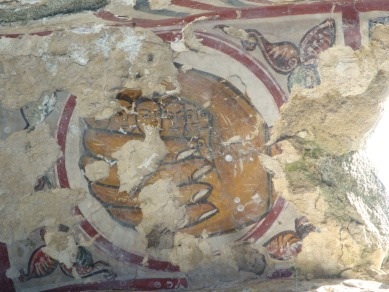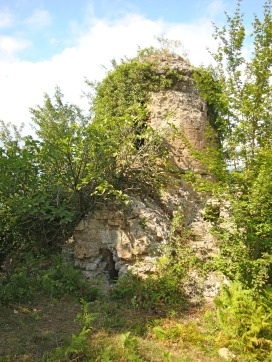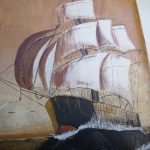“The most complete cycle of frescoes this side of Ani,” said my copy of the Rough Guide to Turkey which was enough to have me hotfooting it back to the dismal mining and dam-building town of Borçka in Turkey’s remote north-east, a town I’d sworn never to revisit after my first visit.
In the otogar I found a taxi driver. “Do you know the way to İbrikli church?” I asked him.
“Yes,” he replied.
“It sounds difficult and I don’t know the way myself,” I went on. The driver shifted slightly on his heels, then went into a huddle with two friends. It was a huddle that had “How do you get there?” written all over it, so I strolled across to listen in.
“Don’t worry, abla, I’m from İbrikli myself. There are two ways to get there. I’m just telling him about the short cut although the road’s very bad.”
Almost reassured, I got into the taxi and off we bumped along the road that passes one of the gigantic dams that will soon be a leitmotif of this part of Turkey. Before long the engine made an alarming juddering sound. “Is it OK?” I asked anxiously. “Because the church is a long way from anywhere.”
“It’s fine,” the driver said, then glanced into the mirror. “I remember you,” he said, and just as he said it I remembered him too. He was the man who had driven me along a 20km mud track leading to one of the region’s many karagöls (black lakes) a year ago. Not only had the road been bad but the mist had been so thick that when we finally reached the lake I could only take his word for it that we’d arrived. We already had form together, then, in the ludicrous journeys stakes.
By the road a brown tourism sign pointed uphill to the church. It said nothing about distance. Nor did it say anything about the state of the road which lured us on for a kilometre or so with a stabilised surface before disintegrating abruptly into mud track.
Up we drove and up into the hills, stopping at one point to give a lift to a young man on his way to a home which was nowhere in sight. No, he didn’t know where the church was but he’d come with us anyway to find out. Later he jumped out of the car to consult a friend who lived even higher up. No, he knew nothing about the church either.
By now the atmosphere inside the taxi was a tad tense. Still, on we drove until eventually the road petered out at a house and a gate. Parking the car, we strolled past the house. A man was working in the garden. “We’re looking for the church,” the taxi driver said brightly.
“What would you be wanting with a church?” the man snarled whereupon I was thrust forward to provide suitable justification. I listened carefully to what he said. Go down the hill, turn right, then left, he said, with many further details. But of course there was no proper path and within minutes we were lost amid a forest of hazelnut trees. By now the young man who had been on his way home was starting to regret his hasty decision to come with us but the taxi driver strode ahead like a man possessed, paying not the slightest heed to my demands that we go back to get better directions.
At this point I started to panic. Here I was, alone on a hillside with two men I didn’t know or greatly trust and not the faintest idea where we were heading. “I’m going back anyway,” I shouted and struck off up the hillside on my own, emerging eventually in a place that bore no resemblance to the one from which we’d started out. Instead this was a cute little hamlet of sturdy houses made of wood-framed brick, and soon I found one whose owners were at home. This being the Black Sea region, the rafters of their house were hung with corncobs while the courtyard was carpeted with drying hazelnuts. A woman emerged to greet me. Unfortunately her first language was Georgian, and we struggled to communicate in our shared second language which was Turkish.
Finally she led me back the way I’d come, leaned over a wall and bawled down the hill to a couple of men mowing a meadow. Needless to say, when I finally reached the church with two completely different men in tow, the original pair were standing in front of it with a look on their faces clearly intended to suggest that they’d known all along how to find it.
After all this excitement any church would have struggled to live up to our expectations. This one, though, was in an abject condition, looking little more from the outside than a pyramid of stones blanketed in undergrowth. There was, however, a way in and the five of us squeezed through it. Only then did I reread the guidebook and take note of the passage where it said that the frescoes were “predictably badly damaged.” Actually, they were more or less obliterated. The only thing I could make out with any certainty was a painting of a giant hand clasping tiny human figures, presumably symbolising souls. Everything else had faded to mush.
“What’s this one?” said the man with the scythe, pointing at a fading fragment, and “what’s this one?” demanded the young hitchhiker. My failure to come up with the answers left them thoroughly contemptuous.
The church floor looked as if wild animals had been rummaging through it. “Altın (gold),” said the hitchhiker gleefully, it being a common belief in these parts that departing Christians always left gold buried for their return, a belief that has led to the wanton destruction of many unguarded monuments.
By now he was starting to get on my nerves. “Of course there wasn’t any gold,” I snarled.
“Yes there was,” he said with a smirk, “and maybe there’s more behind the walls.”
Biting back an ignoble urge to slap him, I contented myself instead with suggesting sneakily that a body might have been buried in the ground just so that I could watch his silly grin morph into a look of horror. The man with the scythe was still muttering about gold. “How would you feel if I went into a mosque, announced that there was gold there and started digging up the floor?” I asked.
It was enough. We slunk out of the church, all of us in our different ways disappointed with the outcome of our adventure. At Borçka bus station I bid my taxi driver farewell. With luck, that’s the last we’ll see of each other.
Written: 28 September 2012
“The most complete cycle of frescoes this side of Ani,” said my copy of the Rough Guide to Turkey which was enough to have me hotfooting it back to the dismal mining and dam-building town of Borçka in Turkey’s remote north-east, a town I’d sworn never to revisit when last I was there.
In the otogar I found a taxi driver. “Do you know the way to İbrikli church?” I asked him.
“Yes,” he replied.
“It sounds difficult and I don’t know the way myself,” I went on. The driver shifted slightly on his heels, then went into a huddle with two friends. It was a huddle that had “How do you get there?” written all over it, so I strolled across to listen in.
“Don’t worry, abla, I’m from İbrikli myself. There are two ways to get there. I’m just telling me about the short cut although the road’s very bad.”
Almost reassured, I got into the taxi and off we went along the road that passes one of the gigantic dams that will soon be a leitmotif of this part of Turkey. Before long the engine made an alarming juddering sound. “Is it OK?” I asked anxiously. “Because the church is a long way from anywhere.”
“It’s fine,” the driver said, then glanced into the mirror. “I remember you,” he said, and just as he said it I remembered him too. He was the man who had driven me along a 20km mud track leading to one of the region’s many karagöls (black lakes) a year ago. Not only had the road been bad but the mist had been so thick that when we finally reached the lake I could only take his word for it that we’d arrived. We already had form together, then, in the ludicruous journeys stakes.
By the road a brown tourism sign pointed uphill to the church. It said nothing about distance. Nor did it say anything about the state of the road which lured us on for a kilometre or so with a stabilised surface before disintegrating abruptly into mud track.
Up we drove and up, into the hills, stopping at one point to give a lift to a young man on his way to a home which was nowhere in sight. No, he didn’t know where the church was, but he’d come with us anyway to find out. Later he jumped out of the car to consult a friend who lived even higher up. No, he knew nothing about the church either.
By now the atmosphere inside the taxi was becoming a tad tense. Still, on we drove until eventually the road petered out at a house and a gate. Parking the car, we strolled past the house. A man was working in the garden. “We’re looking for the church,” the taxi driver said brightly.
“What would you be wanting with a church?” the man snarled whereupon I was thrust forward to provide suitable justification. I listened carefully to what he said. Go down the hill, turn right, then left, he said, with many further details. But of course there was no proper path and within minutes we were lost amid a forest of hazelnut trees. By now the young man who had been on his way home was starting to regret his hasty decision to come with us but the taxi driver strode ahead like a man possessed, paying not the slightest heed to my demands that we go back to get better directions.
At this point I started to panic. Here I was, alone on a hillside with two men I didn’t know or greatly trust and not the faintest idea where we were heading. “I’m going back anyway,” I shouted and struck off up the hillside on my own, emerging eventually in a place that bore no resemblance to the one from which we’d started out. Instead this was a cute little hamlet of sturdy houses made of wood-framed brick, and soon I found one whose owners were at home. This being the Black Sea, the rafters of their house were hung with corncobs, while the courtyard was carpeted with drying hazelnuts. A woman emerged to greet me. Unfortunately her first language was Georgian, and we struggled to communicate in our shared second language which was Turkish.
Finally she led me back the way I’d come, leaned over a wall and bawled down the hill to a couple of men mowing a meadow. Needless to say, when I finally reached the church with two completely different men in tow, the original pair were standing in front of it with a look on their faces clearly intended to suggest that they’d known all along how to find it.
After all this excitement any church would have struggled to live up to our expectations. This one, though, was in an abject condition, looking little more from the outside than a pyramid of stones blanketed in undergrowth. There was, however, a way in and the five of us squeezed through it. Only then did I reread the guidebook and take note of the passage where it said that the frescoes were “predictably badly damaged.” Actually, they were more or less obliterated. The only thing I could make out with any certainty was a painting of a giant hand clasping tiny human figures, presumably symbolising souls. Everything else had faded to mush.
“What’s this one?” said the man with the scythe, pointing at a fading fragment, and “what’s this one?” demanded the young hitchhiker. My failure to come up with the answers left them looking thoroughly contemptuous.
The church floor looked as if wild animals had been rummaging through it. “Gold,” said the hitchhiker gleefully, it being a common belief in these parts that departing Christians always left gold buried for their return, a belief that has led to the wanton destruction of many unguarded monuments.
By now he was starting to get on my nerves. “Of course there wasn’t any gold,” I snarled.
“Yes there was,” he said with a smirk, “and maybe there’s more behind the walls.”
Biting back an ignoble urge to slap him I contented myself instead with suggesting sneakily that a body might have been buried in the ground just so that I could watch his silly grin morph into a look of horror. The man with the scythe was still muttering about gold. “How would you feel if I went into a mosque, announced that there was gold there and started digging up the floor?” I asked.
It was enough. We slunk out of the church, all of us in our different ways disappointed with the outcome of our adventure. At Borçka bus station I bid my taxi driver farewell. With luck, that’s the last we’ll see of each other.

